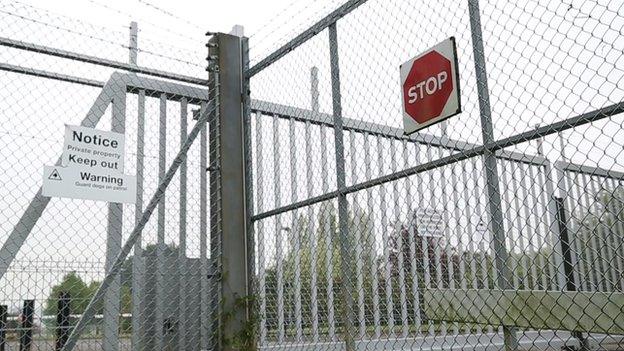Fast-track asylum appeal system suspended by Court of Appeal
- Published

Yarl's Wood in Bedfordshire is one of the UK's immigration detention centres
The fast-track system which detains asylum seekers while they appeal against decisions has been suspended by the Court of Appeal.
The system was introduced a decade ago as a key part of the government's drive to remove failed asylum seekers.
But the Court of Appeal ruled the government must stop the system immediately after an earlier High Court hearing concluded it was unlawful.
The government said it would appeal against the case's main judgement.
The fast-track system accelerates legal hearings and appeals, while keeping the individual detained at all times.
A previous hearing at the High Court ruled the system was unlawful, and contained "structural unfairness".
At the time, High Court judge Mr Justice Nicol put a "legal stay" - a temporary delay - on his decision, which meant the fast-track system remained in operation until the government had exhausted all opportunities to appeal.

Analysis by Dominic Casciani, home affairs correspondent
This successful challenge to the asylum system is a significant defeat for the Home Office, given the political and symbolic importance of effective immigration detention to this government and its predecessors.
But, crucially, it is not quite a fatal blow to the controversial fast track procedures and it will not lead to the gates of the UK's immigration removal centres being thrown open.
In practice, immigration officers can still decide to initially detain some asylum applicants while accelerating a decision in their case. But if the individual is refused permission to stay in the UK and then appeals, they will be able to seek bail while their case is reviewed.
Critics of the Detained Fast Track system say this is an important victory for justice because the applicants need time to properly prepare their cases, including access to expert legal advice.

Giving his reasons, Lord Justice Sullivan said the reputation of the justice system might suffer if cases were heard under an unlawful process, and a "very horrible waste of money" if cases had to be heard again.
The programme accelerated some 4,300 asylum applications or decisions in 2013. It currently processes 30 to 40 cases a week.
'Deeply flawed process'
The BBC's Danny Shaw said the ruling meant 300 to 400 asylum seekers who are detained pending removal could now apply for bail while their cases are reconsidered.
The government did not challenge the lifting of the stay, but will still be able to appeal against the High Court's overall ruling that the system is unlawful.
The High Court decision was a victory for the charity Detention Action, set up in 1993 to support and campaign on behalf of individuals held in immigration detention.
Detention Action director Jerome Phelps said he was "delighted" asylum-seekers would no longer face a detained appeals process that was "so unfair as to be unlawful".
"It is unfortunate that it has taken so many court rulings to finally suspend this deeply flawed process," he said.
"People seeking protection from war and persecution deserve better from British justice."
However, a government spokesman said the system was "an important part of our immigration system".
The spokesman added: "It contributes significantly to the speed and effectiveness with which asylum cases are processed - including swiftly removing those found not to be in need of protection - and saves the taxpayer money."
- Published12 June 2015
